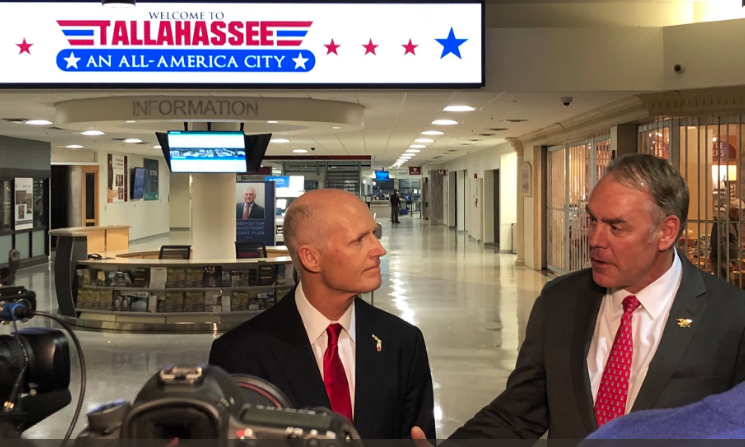Interior Secretary Ryan Zinke suddenly reversed plans to open federal waters near Florida to oil and gas exploration, after meeting with Gov. Rick Scott who insisted the Sunshine State — a critical swing vote for President Trump and Republicans — should be exempted from any expansion of offshore energy development.
Zinke’s announcement after a Tuesday meeting with Scott at Tallahassee International Airport was a shock to both supporters and opponents of offshore drilling, coming just days after Zinke said the department would move to open most of the Outer Continental Shelf (OCS) for leasing.
“I support the governor’s position that Florida is unique and its coasts are heavily reliant on tourism as an economic driver,” Zinke said in a statement issued late Tuesday. “As a result of discussion with Governor Scott and his leadership, I am removing Florida from consideration for any new oil and gas platforms.”

Critics saw it as a political move to benefit Scott, who is expected to seek a U.S. Senate seat as he finishes his governorship.
Taking the eastern Gulf of Mexico off the table is a blow to offshore interests, who see much future potential in the region. Randall Luthi, president of the National Ocean Industries Association, called the reversal “disappointing and premature.”
“Removing areas offshore Florida this early in the planning process prematurely curtails dialogue and thorough study of the possibilities for future development of offshore resources that could provide additional energy and jobs for working Floridians,” Luthi said in a NOIA statement. “In addition, for a state whose tourism economy is dependent on a secure and affordable transportation fuel supply, failure to secure domestic production and supply of fuels actually is a greater economic risk than offshore development.”
Drilling opponents in East Coast states and California jumped on Zinke’s recognition of Florida’s tourism economy, saying their states deserve as much consideration.
States like New York and New Jersey opposed mid-Atlantic leasing and helped push the Obama administration into removing the region from its OCS plan. Rep. Frank Pallone, D-N.J., said his coastal district would be as much at risk as Florida from offshore accidents.
“The Jersey Shore is home to over $700 billion in coastal properties and a tourism industry that generates $38 billion a year and directly supports almost half a million direct and indirect jobs, or nearly ten percent of the state’s entire workforce. New Jersey’s vibrant commercial fishing industry generates over $7.9 billion annually and supports over 50,000 jobs,” said Pallone. “Like Florida, New Jersey can simply not afford a spill off its coast or anywhere in the Atlantic.”
"As Florida is now apparently removed, so should all of the Atlantic," said Pallone's Republican colleague Rep. Frank LoBiondo, R-N.J.
Pallone and others derided Zinke’s turnabout as a whim based on Trump’s relationship with Scott. Florida Sen. Bill Nelson — a longtime Democratic lawmaker who has criticized Scott on environmental policies — called the maneuver “a political stunt” to burnish Scott’s credentials for a Senate run.

Under the planning process, Interior officials hold numerous public hearings, and take into account positions, pro and con, presented by state governors. Arguing that Zinke acted arbitrarily in giving Scott and Florida an early escape could help California and other coastal states in challenging the Department of Interior, both during the planning process and in the courts.
The decision “violates the legal standard of arbitrary and capricious agency action,” Rep. Ted Lieu, D-Calif., wrote on Twitter after Zinke’s announcement. “California and other coastal states also rely on our beautiful coasts for tourism and our economy. I believe courts will strike this down.”





